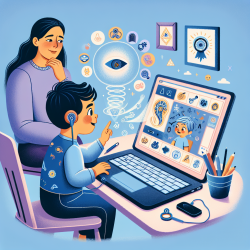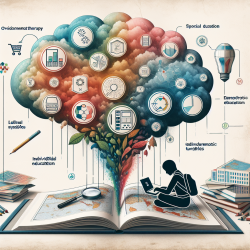In the ever-evolving field of online therapy services, staying ahead of the curve requires integrating cutting-edge research and data-driven insights. The research article "Performance of the ATLAS muon trigger in pp collisions at (\sqrt{s}=8) TeV" provides valuable lessons that can be applied to improve online therapy practices, particularly in special education settings.
The ATLAS muon trigger system is designed to detect and measure muons with high efficiency and accuracy, even in challenging environments. This system's success can be attributed to several key strategies that can be adapted for online therapy services:
- Data-Driven Decision Making:
The ATLAS muon trigger system relies on real-time data analysis to make split-second decisions. Similarly, online therapy platforms can use data analytics to monitor and evaluate therapy sessions continuously. By analyzing patterns and outcomes, therapists can adjust their approaches to better meet the needs of each student. - Layered Approach:
The ATLAS system uses a three-level trigger strategy to ensure accurate muon detection. Online therapy can adopt a layered approach to intervention, where initial assessments are followed by targeted strategies and ongoing evaluations. This ensures that interventions are both effective and adaptable to changing needs. - Customization and Personalization:
The muon trigger system is highly customizable, allowing it to be fine-tuned for specific conditions. Online therapy platforms should offer customizable features that allow therapists to tailor their sessions to the individual needs of students. This could include personalized learning plans, adjustable communication tools, and adaptable therapy modules. - Continuous Improvement:
The ATLAS system undergoes constant performance evaluations and updates to maintain its high efficiency. Online therapy services should implement a continuous improvement model, regularly reviewing and updating their methods based on feedback and new research findings. This will help maintain high standards of care and effectiveness. - Integration of Technology:
Advanced technology plays a crucial role in the ATLAS system's success. Online therapy platforms should leverage the latest technological advancements, such as artificial intelligence and machine learning, to enhance the delivery and effectiveness of therapy. These technologies can help in identifying areas for improvement and providing real-time support to therapists. - Collaboration and Communication:
The success of the ATLAS muon trigger system is also due to the collaboration among a global team of scientists and engineers. Online therapy services can benefit from fostering a collaborative environment where therapists, educators, and parents work together to support the student's progress. Effective communication channels and shared goals can lead to better outcomes.
Implementing these strategies can significantly enhance the effectiveness of online therapy services, making them more responsive and personalized to the needs of students in special education. By drawing on the principles of the ATLAS muon trigger system, online therapy providers can improve their services' quality and impact.
To read the original research paper, please follow this link: Performance of the ATLAS muon trigger in pp collisions at (\sqrt{s}=8) TeV.










